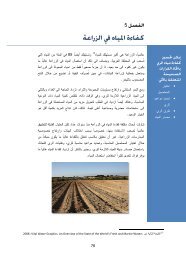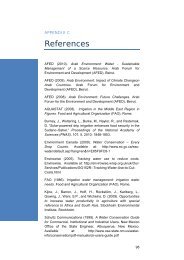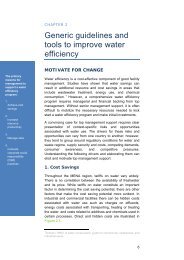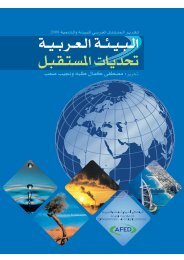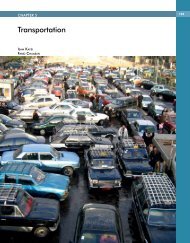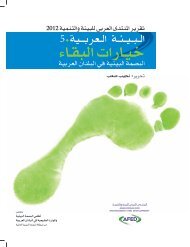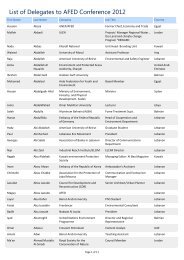Impact of Climate Change on Arab Countries - (IPCC) - Working ...
Impact of Climate Change on Arab Countries - (IPCC) - Working ...
Impact of Climate Change on Arab Countries - (IPCC) - Working ...
You also want an ePaper? Increase the reach of your titles
YUMPU automatically turns print PDFs into web optimized ePapers that Google loves.
6<br />
CHAPTER 1<br />
ARAB PUBLIC OPINION AND CLIMATE CHANGE<br />
FIGURE 5<br />
90<br />
78<br />
80<br />
70<br />
60<br />
50<br />
40<br />
30<br />
20<br />
10<br />
0<br />
Health<br />
DO YOU THINK CLIMATE CHANGE WILL AFFECT ANY<br />
ONE OF THE FOLLOWING SECTORS IN YOUR COUNTRY<br />
(YOU MAY SELECT ANY NUMBER OF OPTIONS)<br />
72<br />
Drinking<br />
water<br />
69<br />
Food<br />
TOTAL SAMPLE<br />
53<br />
Coastal<br />
areas<br />
47<br />
III. ARAB PUBLIC OPINION AND CLI-<br />
MATE CHANGE SURVEY: DETAILED<br />
ANALYSIS<br />
1- Do you understand what climate<br />
change is<br />
The majority <str<strong>on</strong>g>of</str<strong>on</strong>g> resp<strong>on</strong>dents, 95%, answered<br />
positively, 5% said they did not understand or<br />
did not know. The highest percentage <str<strong>on</strong>g>of</str<strong>on</strong>g> those<br />
who answered ‘yes’ was in Qatar, Oman, Tunis<br />
and Palestine (100%). The highest percentages <str<strong>on</strong>g>of</str<strong>on</strong>g><br />
those who said they did not understand what climate<br />
change were scored in Syria (11%),<br />
Morocco (8%), Leban<strong>on</strong> (7%), Saudi <strong>Arab</strong>ia<br />
(6%), UAE (4%) and Egypt (3%).<br />
While no major differences were observed am<strong>on</strong>g<br />
39<br />
Forests Tourism It will not No answer<br />
affect any<br />
sector<br />
1<br />
regi<strong>on</strong>al groups (Levant and Egypt, Gulf, North<br />
Africa), variati<strong>on</strong>s showed am<strong>on</strong>g age groups,<br />
with the highest level <str<strong>on</strong>g>of</str<strong>on</strong>g> ignorance <str<strong>on</strong>g>of</str<strong>on</strong>g> the problem<br />
am<strong>on</strong>g those below 30-years old (7.5%)<br />
compared to <strong>on</strong>ly 3% am<strong>on</strong>g the over 41 group.<br />
Variati<strong>on</strong>s also showed within different educati<strong>on</strong><br />
categories, with 10% <str<strong>on</strong>g>of</str<strong>on</strong>g> the below university<br />
level educati<strong>on</strong> group pr<str<strong>on</strong>g>of</str<strong>on</strong>g>essing not to understand<br />
what climate change is, compared to 3%<br />
for university level resp<strong>on</strong>dents. This reflects the<br />
fact that higher educati<strong>on</strong> brings better awareness<br />
<str<strong>on</strong>g>of</str<strong>on</strong>g> envir<strong>on</strong>mental challenges. However, we would<br />
have expected higher awareness am<strong>on</strong>g younger<br />
generati<strong>on</strong>s compared to the older groups, which<br />
showed not to be the case.<br />
2- Do you believe that the climate is<br />
changing<br />
A resounding 98% answered that they believe the<br />
climate is changing. It was remarkable that the<br />
percentage reached 100% in some countries<br />
where the level <str<strong>on</strong>g>of</str<strong>on</strong>g> understanding <str<strong>on</strong>g>of</str<strong>on</strong>g> the climate<br />
change issue was the lowest, such as Syria,<br />
Morocco and Saudi <strong>Arab</strong>ia. Regi<strong>on</strong>al group averages<br />
were uniform, and no major disparities were<br />
recorded am<strong>on</strong>g different age, educati<strong>on</strong> or<br />
income groups. Results show that am<strong>on</strong>g the<br />
98% who agreed that the climate is changing,<br />
between 5-10% did not understand why.<br />
3- Is climate change mainly caused by<br />
human activities (industry, transportati<strong>on</strong>,<br />
power generati<strong>on</strong>, urbanizati<strong>on</strong>,<br />
etc)<br />
FIGURE 6<br />
IT IS OF A HIGH IMPORTANCE AND BENEFIT THAT MY<br />
COUNTRY PARTICIPATE IN WORLDWIDE ACTION TO<br />
LIMIT CLIMATE CHANGE<br />
Agree 94%<br />
Total Sample<br />
Agree Disagree I d<strong>on</strong>'t know<br />
3% Disagree<br />
3% I d<strong>on</strong>'t know<br />
89% <str<strong>on</strong>g>of</str<strong>on</strong>g> the total sample agreed that climate<br />
change was primarily caused by human activity.<br />
The highest percentage <str<strong>on</strong>g>of</str<strong>on</strong>g> those who agreed was<br />
in North Africa (93%), followed by the Gulf<br />
countries (89%) and the Levant (86%). It is<br />
remarkable that the highest percentage <str<strong>on</strong>g>of</str<strong>on</strong>g> disagreement<br />
came from Syria (28% disagree, 4%<br />
do not know), followed by Qatar (26% disagree,<br />
3% do not know) and Morocco (14% disagree,<br />
3% do not know). The percentage <str<strong>on</strong>g>of</str<strong>on</strong>g> those who<br />
thought that climate change was mainly due to<br />
human activities was highest in Oman, Tunisia<br />
and Palestine (100%), Egypt (98%) and Jordan<br />
(96%). In Saudi <strong>Arab</strong>ia, 92% said it was due to<br />
human activities, while 7% disagreed, compared<br />
to 90% who agreed in UAE and 88% in Kuwait.<br />
This clearly shows that the majority <str<strong>on</strong>g>of</str<strong>on</strong>g> resp<strong>on</strong>-



